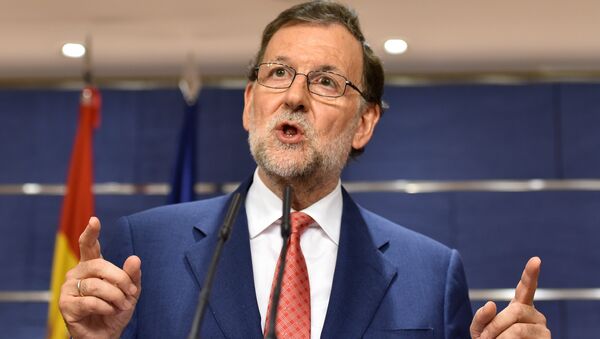Sputnik (Maud Start): With neither Puigdemont nor Rajoy content to back down from their goals, what is the most likely outcome here?
Carlos Flores Juberias (CFL): Well the most likely outcome is that, as it has been announced, the government will hold an extraordinary meeting on Saturday, and they will initiate the steps to implement Section 155 of the Spanish Constitution. This will probably lead to intervention, and the limitation of the Catalan political institutes. The Catalan Government has threatened to retaliate by fully declaring independence. This is quite misleading as independence was supposed to have already been declared and then suspended, so they are going to suspend the suspension, which is quite a misleading position. The most likely scenario will be that the Catalan institutions will be intervened, a process starting on Saturday.
Sputnik (Maud Start): The two political prisoners, Jordi Sanchez and Jordi Cuixart have urged the secessionists to stay strong, saying that if they keep at it they will achieve independence. Is force of will strong enough to resist the actions of Spain?
CFL: Certainly not, we are a rule-of-law state, we have a legal system made of several kinds of laws, and there is a hierarchical structure in the system which puts the Constitution on top. The statute of autonomy of Catalonia derives from the Constitution. The autonomous systems of Catalonia have a source of legitimacy in the political system that is created by the Constitution. There are no historical rights, there are no previous rights, there is no previous situation of self-governance and there is not an agreement on the side of the autonomous committee to create a state. We are not the United States, what we have is a countries' nation, that is, the Spanish Country, the Spanish State, that provided self-governance to its regions, but within the framework of the Constitution. So there is no doubt in my mind, no doubt in the judicial bodies of Spain and no doubt in most of public opinion that the Spanish Constitution is superior to the autonomous systems of Catalonia.
Sputnik (Maud Start): So why then would Puigdemont not have accepted Rajoy's offer yesterday, saying he will back down if the Catalan Government was to call a snap regional election, and denounce the declaration of independence?
CFL: Because his (Puigdemont's) position is that he wants to secede, legally or illegally, with consent or without consent, with majority or without majority of support from the Catalan society. Please have in mind that in the illegal referendum that was called on October the 1st in which the polls were put in by the Catalan government, the votes were counted by the Catalan government, with absolutely no independent supervision, with no judicial control, no international intervention. The result was two million in favor of independence, which is less than half of the electorate. This has not stopped Puigdemont from pursuing independence, even though he has the Constitution, the courts, the institutions, and most of the Spanish and Catalan citizens against it.
Sputnik (Maud Start): So in regards to the triggering of Article 155, how will this affect the Catalan citizens that did not want independence?
CFL: What the state is doing now is trying to guarantee the rights of all Catalan citizens regardless of their ideology or political position. In the resolution issued yesterday by the Constitutional Court, declaring the provisional Constitution of Catalonia illegal, the Court said that this document disclosed an unlimited power, devoid of any limits. This is one of the side problems of this issue, that the Catalan government is going for independence regardless of whether this jeopardizes their citizens' rights. We have a Catalan government with a closed parliament, they have not been meeting for last month, they are controlling public media and television, moving masses in the streets, attacking the central institution of the state, and the police and the civil guard. Also they are pouring lots of money, in an illegal way, to spread the secession, and even interfering in the right to privacy of the citizens by controlling their data and information about them. In Catalonia, what we have is a really authoritarian government, going about trying to break the country and make vulnerable the rights of its citizens. So the state is not only trying to preserve national unity and supremacy of the law, but even to protect the rights of its citizens.


